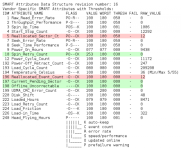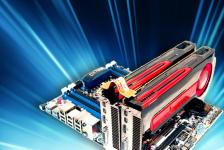MECHREVO Yilong15Pro Series GM5HG0A
HW: AMD Ryzen 7 8745H w/ Radeon 780M Graphics, AMD + Nvidia graphics, memory module(s) 32GB, one drive (Yangtze Memory Technologies Co.,Ltd YMTC PC41Q-1TB-B 1024GB), 15.3-inch display.
Kernel: 6.11.0-21-generic
PROBE ID
HW: AMD Ryzen 7 8745H w/ Radeon 780M Graphics, AMD + Nvidia graphics, memory module(s) 32GB, one drive (Yangtze Memory Technologies Co.,Ltd YMTC PC41Q-1TB-B 1024GB), 15.3-inch display.
Kernel: 6.11.0-21-generic
PROBE ID
LI1BV/LI1BV-L 1.0
HW: Intel Celeron J6412, Intel graphics, one memory module (Hewlett-Packard 7EH98AA# 8GB), one drive (Seagate ST250LT020-1AE14C 250GB).
Kernel: 6.1.50-1-generic
PROBE ID
HW: Intel Celeron J6412, Intel graphics, one memory module (Hewlett-Packard 7EH98AA# 8GB), one drive (Seagate ST250LT020-1AE14C 250GB).
Kernel: 6.1.50-1-generic
PROBE ID
Fujitsu FMVNA5NE
HW: Intel Core i5-2520M CPU, Intel graphics, memory module(s) 8GB, one drive (Crucial CT1000MX500SSD1 1TB), 15.5-inch display and 28 more devices.
Kernel: 6.11.0-21-generic
PROBE ID
HW: Intel Core i5-2520M CPU, Intel graphics, memory module(s) 8GB, one drive (Crucial CT1000MX500SSD1 1TB), 15.5-inch display and 28 more devices.
Kernel: 6.11.0-21-generic
PROBE ID
ASUSTek Computer M52BC
HW: AMD FX-8300 Eight-Core Processor, AMD graphics, memory module(s) 12GB, one drive (TOSHIBA DT01ACA200 2TB) and 40 more devices.
Kernel: 6.8.0-57-generic
PROBE ID
HW: AMD FX-8300 Eight-Core Processor, AMD graphics, memory module(s) 12GB, one drive (TOSHIBA DT01ACA200 2TB) and 40 more devices.
Kernel: 6.8.0-57-generic
PROBE ID
Medion E2227T MD60798
HW: Intel Atom x5-Z8300 CPU, Intel graphics, memory module(s) 4GB and 28 more devices.
Kernel: 6.11.0-19-generic
PROBE ID
HW: Intel Atom x5-Z8300 CPU, Intel graphics, memory module(s) 4GB and 28 more devices.
Kernel: 6.11.0-19-generic
PROBE ID
Sony VPCZ120GL
HW: Intel Core i5 CPU M 540, Nvidia graphics, memory module(s) 8GB, 2 drives (2 x TOSHIBA THNS064GG2BNAA 64GB SSD), 13.2-inch display.
Kernel: 6.9.3-76060903-generic
PROBE ID
HW: Intel Core i5 CPU M 540, Nvidia graphics, memory module(s) 8GB, 2 drives (2 x TOSHIBA THNS064GG2BNAA 64GB SSD), 13.2-inch display.
Kernel: 6.9.3-76060903-generic
PROBE ID
Intel ID70 V114
HW: Intel Atom CPU D2550, Intel graphics, one memory module (Samsung M471B5173DB0-YK0 4GB), 2 drives (China SSD 128GB, WDC WD5000LPVX-22V0TT0 500GB).
Kernel: 6.12.16-gentoo-dist
PROBE ID
HW: Intel Atom CPU D2550, Intel graphics, one memory module (Samsung M471B5173DB0-YK0 4GB), 2 drives (China SSD 128GB, WDC WD5000LPVX-22V0TT0 500GB).
Kernel: 6.12.16-gentoo-dist
PROBE ID
We've started to highlight most important SMART attributes in computer probes, that correlate with real mechanical failures according to Google and Backblaze studies.
Green highlights the zero value of important attributes, red — any positive value ...
Green highlights the zero value of important attributes, red — any positive value ...
A new project has been created to collect the list of computer hardware devices with poor Linux compatibility based on the Linux-Hardware.org data for 4 years.
There are about 26 thousands of depersonalized hwinfo reports in the repository from computers in various configurations (different kernels, OS — mostly ROSA Fresh). The device is included into the list of poorly supported devices if there is at least one user probe in which the driver for this device was not found. The column 'Missed' indicates the percentage of such probes. If number of such probes is small, it means that the driver was already added in newer versions of the OS. In this case we show minimal version of the Linux kernel in which the driver was present.
Devices are divided into categories. For each category we calculate the ratio of poorly supported devices to the total number of devices tested in this category.
At the moment, the study is limited only to PCI and USB devices. In the future, it is planned to include the rest.
Please check the presence of known unsupported devices in the table. The device ID can be taken from the output of the 'lspci -vvnn' command in square brackets, for example [1002:9851].
There are about 26 thousands of depersonalized hwinfo reports in the repository from computers in various configurations (different kernels, OS — mostly ROSA Fresh). The device is included into the list of poorly supported devices if there is at least one user probe in which the driver for this device was not found. The column 'Missed' indicates the percentage of such probes. If number of such probes is small, it means that the driver was already added in newer versions of the OS. In this case we show minimal version of the Linux kernel in which the driver was present.
Devices are divided into categories. For each category we calculate the ratio of poorly supported devices to the total number of devices tested in this category.
At the moment, the study is limited only to PCI and USB devices. In the future, it is planned to include the rest.
Please check the presence of known unsupported devices in the table. The device ID can be taken from the output of the 'lspci -vvnn' command in square brackets, for example [1002:9851].
A new open project has been created to estimate reliability of hard drives (HDD/SSD) in real-life conditions based on the SMART data collected in the Linux-Hardware.org database. The initial data (SMART reports), analysis methods and results are publicly shared in a new GitHub repository. Everyone can contribute to the report by uploading probes of their computers by the hw-probe tool!
The primary aim of the project is to find drives with longest "power on hours" and minimal number of errors. We use the following formula as a measure of reliability: Power_On_Hours / (1 + Number_Of_Errors), i.e. time to the first error/between errors.
Please be careful when reading the results table. Pay attention not only to the rating, but also to the number of checked model samples. If rating is low, then look at the number of power-on days and number of errors occurred. New drive models will appear at the end of the rating and will move to the top in the case of long error-free operation.
You can, as before, create a probe of your computer via the application in SimpleWelcome menu or from the console by a simple command:
hw-probe -all -upload
The primary aim of the project is to find drives with longest "power on hours" and minimal number of errors. We use the following formula as a measure of reliability: Power_On_Hours / (1 + Number_Of_Errors), i.e. time to the first error/between errors.
Please be careful when reading the results table. Pay attention not only to the rating, but also to the number of checked model samples. If rating is low, then look at the number of power-on days and number of errors occurred. New drive models will appear at the end of the rating and will move to the top in the case of long error-free operation.
You can, as before, create a probe of your computer via the application in SimpleWelcome menu or from the console by a simple command:
hw-probe -all -upload




